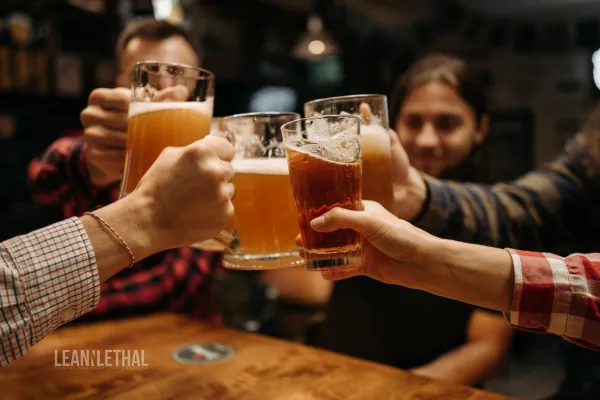
Is Alcohol Killing Your Gains?
Is Alcohol Killing Your Gains?
For a lot of guys, grabbing a drink on the weekend feels like part of the lifestyle. Social events, business dinners, game days—alcohol is everywhere. It becomes the norm: you go to the lake, you drink. At a tailgate, you drink. Grilling with the boys? A couple beers go hand-in-hand.
This was me for years, and I never realized the effect it was having until I cut it out for an entire year. Learning how alcohol truly impacted my body—not just getting buzzed or waking up groggy—gave me a new perspective and made it easier to pick and choose when I wanted to indulge. So if you’re serious about getting lean, building muscle, and optimizing performance, you need to ask yourself one thing:
Is alcohol slowing you down?
This article breaks down exactly how alcohol affects fat loss, muscle growth, recovery, and mindset. You’ll get the science, real-world insight, and walk away knowing how alcohol truly affects your goals—and how to navigate it depending on your priorities.
Alcohol and Fat Loss
Here’s the cold, hard truth: alcohol halts fat burning. Your body treats ethanol as a toxin and prioritizes metabolizing it first. While your liver is dealing with that whiskey, fat oxidation drops significantly. A 1991 study in The American Journal of Clinical Nutrition found alcohol can reduce lipid (fat) oxidation by over 70%.
Alcohol is also liquid calories with zero nutritional value. A few beers or cocktails can easily add 500–1000 calories to your day without any satiety. Add impaired judgment (hello, late-night fast food), and you’ve got a recipe for stalled fat loss.
Alcohol and Muscle Growth
Building muscle requires recovery, protein synthesis, and hormonal balance. Alcohol interferes with all three.
A study published in PLOS ONE (2014) found that post-exercise alcohol consumption significantly reduces muscle protein synthesis—even when protein is consumed alongside it. It delays recovery and can lead to more muscle breakdown.
Alcohol also lowers testosterone and increases cortisol—two hormonal shifts that directly oppose muscle building. One or two drinks won’t wreck your progress overnight, but regular drinking multiple times a week? That will have a negative impact.
Alcohol and Recovery
Good recovery = better performance. Alcohol crushes sleep quality, lowers REM sleep, and disrupts circadian rhythm. A 2018 meta-analysis in JMIR Mental Health showed even moderate alcohol intake impairs sleep and hampers physical and mental recovery.
I’ve seen this firsthand with my Garmin. I typically average sleep scores in the 80s and 90s. After just two drinks? That drops into the 40s or 50s. People confuse falling asleep quickly with getting good sleep. Substances like alcohol (and weed) may knock you out, but the quality of sleep is diminished.
Add in dehydration, inflammation, and stress on the immune and endocrine systems, and you’re setting your body up for subpar performance.
Alcohol and the Mind
Don’t overlook the mental side. Alcohol alters dopamine and serotonin levels, which can leave you mentally foggy, anxious, or unmotivated in the days after drinking. That emotional dip kills momentum, discipline, and confidence.
A 2020 study in Addiction Biology linked repeated alcohol consumption to impaired cognitive flexibility and lower motivation. It makes it harder to make good decisions—especially around food and training. You’re already surrounded by snacks, people eating casually, and social pressure. Add impaired judgment, and the wheels come off.
How I See It
Look, I’ve been that guy. I trained hard, meal prepped like a machine, and still couldn’t figure out why progress stalled. The answer? The drinks.
I’m not here to shame anyone. But if you're trying to maximize results, alcohol has no place in your life, at least for a season.
These days, I don’t avoid alcohol completely. I’m just intentional. If I’m at a dinner or on the lake with friends, I’ll stick to a non-alcoholic drink. But if it’s a special event or I’m traveling and a couple drinks will elevate the experience, I’ll enjoy a few. Not weekly. Not often. And the difference is night and day.
My rule: If drinking won’t enhance the experience, or if it’s something that happens often (weekly/monthly), I pass. I’d rather stay sharp and aligned with my goals.
Be honest with yourself. If you're drinking regularly, your progress will reflect that. Period.
Minimizing the Damage (If You Choose to Drink)
If you're going to have a few drinks, here’s how to limit the impact:
Drink earlier in the day to avoid crushing your sleep.
Hydrate aggressively—before, during, and after. Alternate each alcoholic drink with water or a non-alcoholic option.
Use zero-calorie mixers like soda water or diet sodas.
Avoid binge drinking. Limit yourself to 1–3 drinks. Set your limit before you start and communicate it to those around you.
Don’t skip meals. Fuel your body with protein-rich meals before drinking.
Train earlier in the day, and avoid alcohol post-workout.
If you want to build a lean, disciplined, high-performing body—cutting out alcohol is one of the simplest accelerators.
You don’t have to quit forever. Just take a break. Go all-in for 30–60 days. See what happens when your body and mind are fully aligned with your mission.
You’ll be shocked at what you’re capable of.
Want help dialing in your habits, nutrition, and performance? DM me “READY” and I’ll show you how to build a body and mindset that operate at a higher standard.